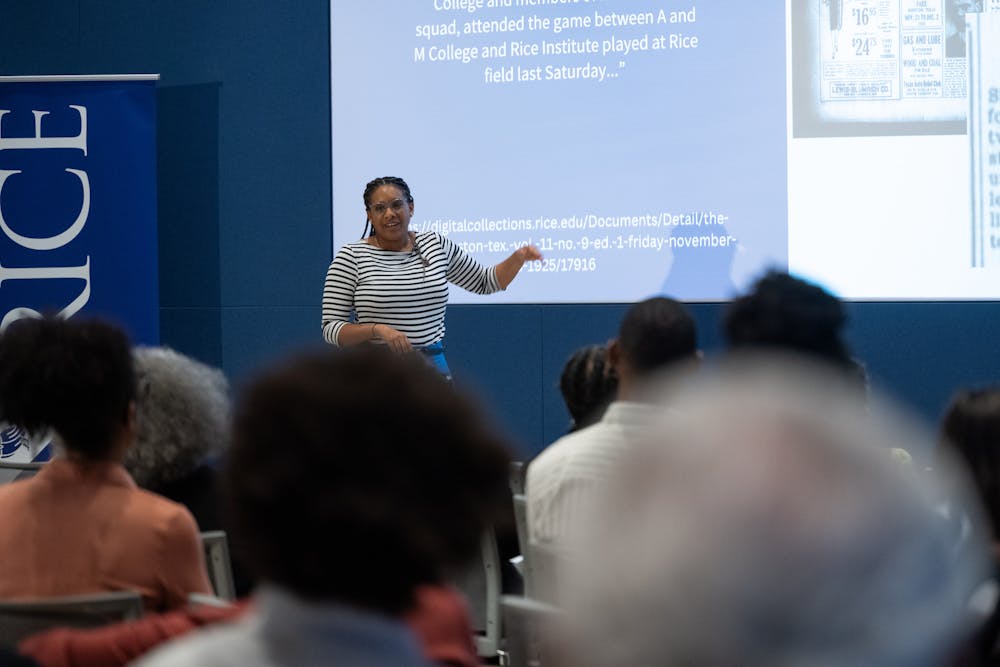Hopkins dives into Black history at Rice archives

Rice’s Black History Month Committee hosted a series of over 20 events, spanning academic and social spheres and facilitating conversations around the history of African Americans throughout the month.
University historian Portia Hopkins, who works to expand the university archives and support on-campus research, led a lecture Feb. 27.
The lecture, “Tracing the History of Blacks at Rice Through University Records,” was presented through three time periods: 1910-1965, 1963-1995 and 1995-present. Hopkins highlighted the hidden history and contribution of Black and Brown people in Rice’s physical construction, academic milestones, integration and student protests.
Looking through the archives, Hopkins began with the first mention of the Rice Institute in the Houston Post.
“When I see these newspapers, I think about the people who are unnamed, and the ways that the unnaming actually stripped them of their identity and stripped them of their agency,” Hopkins said.
She spoke about how while Black and Brown workers quite literally laid the groundwork for the university as underpaid builders, their names could only be found through an employment sheet.
“How can the archive help us recover these early histories?” Hopkins asked. “What we can do is use census data … to look up the names, cross reference with how they’re listed as laborers or construction workers or bricklayers and identify where they were working. We can look at the proximity and we can, with fair certainty, identify some of the workers that labored under the Texas sun for this institution.”
By examining a 1925 Houston Informer newspaper, Hopkins found that Black college students from Prairie View A&M University came to Rice for a football game before integration. Rice had a fully white student body at the time.
“Now there’s lots of politics at play here,” Hopkins said. “Because we have to wonder, ‘Where did they sit? Where could they relieve themselves? Could they eat? Did they bring food? Were they able to join in with the concessions? Were the traditions that were here strange to them, because they were in an HBCU?’ These questions come to mind when we think about how Rice Institute is discussed in Black newspapers.”
Hopkins then discussed a series of firsts that happened at Rice.
She spoke about Raymond Johnson, the first Black student at Rice, who received a doctorate in mathematics and became the first Black professor of mathematics at the University of Maryland. She also talked about Jacqueline Elizabeth McCauley, the first Black woman to attend Rice and the first and only Black National Merit Scholar in Houston at the time; Linda Faye Williams, the first Black woman to graduate from Rice; and Theodore Marshall Henderson, the first Black male to graduate as an undergraduate at Rice and later the first Black board member of Galveston Independent School District.
“Now we’re starting to see a pattern, right? These are people that are breaking down barriers at Rice, but they’re also kicking down doors wherever they go next,” Hopkins said.
During her lecture, Hopkins shared a photo of Black students protesting, pressuring Rice to hire a Black professor, with signs such as “Integration with Segregation Brings About Demonstration” and “One Whole Black Professor, Give Us Another Token, Please.”
Coming to the present day, Hopkins drew parallels with the Black Lives Matter movement and the removal of the Willy statue.
“There was a picture that the student photographer took, and if you zoom in, you can look in the architecture building and you see students,” Hopkins said. “There’s this picture of this Black woman and she’s just smiling like this. And I was just like, ‘girl, that says everything I need to know about how you feel about the statue coming down.’”
Hopkins said uncovering stories through archives allows us to make space for inclusivity.
“Oftentimes we are missing stories in the archive, and it’s not because the stories are not important,” Hopkins wrote in an email to the Thresher. “What usually happened is, for whatever the reason, the records were not preserved. Our job now is to start where we are in the present, record what we can and recover what we must to tell Rice’s full inclusive history.”
Black Student Association co-president Angelina Hall said she Hopkins’ lecture introspective, finding parallels between the lecture and Hall’s own life.
“I loved that I could really see people that I knew, and even myself, in some of the stuff [Hopkins] was talking about,” Hall said. “It was just really eye-opening in terms of how relevant and recent Black history at Rice is.”
Avery Hartwell, the associate director of DEI for student engagement and a member of the Black History Month Committee, said the most enriching aspect of the month’s programming is in the opportunity to uplift and empower others.
“[The] most fulfilling [part] for me is leveraging my personal lived experiences and resources to take on a leadership role in enriching the Black experience within the Rice community,” Hartwell wrote.
More from The Rice Thresher
Rice welcomes 7.8% of applicants to class of 2029
Rice accepted 2,852 applicants to the class of 2029 March 26, said Yvonne Romero, vice president for enrollment. This represents 7.8% of 36,777, the highest acceptance rate since 2022.

Neurologist Huda Zoghbi announced as commencement speaker
Huda Zoghbi was announced to be the speaker for Rice’s 122th commencement, March 26. Zoghbi is a professor of molecular and human genetics at Baylor College of Medicine.

Out with the old, in with the new
Rice Athletics fired baseball head coach José Cruz Jr. on March 13, less than a month into the season. The baseball team was 2-14 and on a 10 game losing streak at the time of his firing. Just days later, Rice welcomed baseball veteran David Pierce to fill Cruz’s seat.


Please note All comments are eligible for publication by The Rice Thresher.